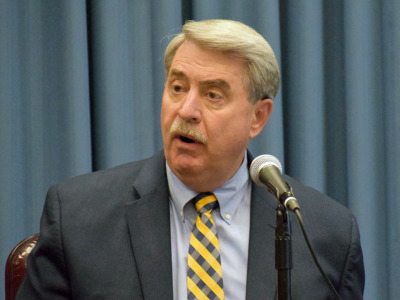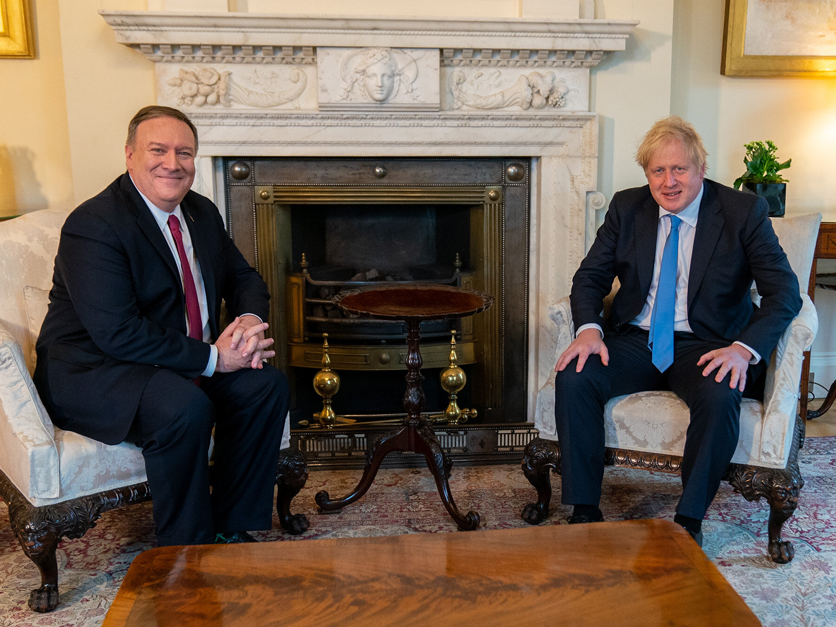The U.K. successfully split from the European Union last week, setting into motion a scramble on both sides of the Atlantic in Washington and Brussels to woo the British into a free-trade agreement as billions of dollars in ag trade hang in the balance.
“I’m excited about that,” U.S. Trade Representative Robert Lighthizer told Agri-Pulse, when asked about the prospect of a free-trade agreement with the U.K. “That’ll be fun.”
British Prime Minister Boris Johnson returned the enthusiasm Monday, saying the U.K. was ready to “get going” on an FTA with the U.S.
If the U.K agreed to drop the tariff and non-tariff barriers that came along with its EU membership, American farmers believe they could sell a lot more grain, meat and produce to the island nation.
The U.K. imports about $3 billion worth of cheese, butter and skim milk powder annually, but only about $9 million worth of the products come from the U.S. because of EU tariffs, according to data from the International Dairy Foods Association.
U.S. officials — including President Donald Trump and Vice President Mike Pence — have been lobbying the British for a free-trade agreement in the months leading up to Brexit, and Secretary of State Mike Pompeo even flew to London the day before it was official to lean on Prime Minister Boris Johnson and British Foreign Secretary Dominic Raab.
The efforts seem to be working.
“There’s a great opportunity for a free-trade deal,” Raab told reporters in a joint press conference with Pompeo. “It’s great.”
Johnson, in a speech entitled “Unleashing Britain’s Potential,” said he realized there is opposition to a closer relationship with the U.S., but stressed that the U.S. already buys one-fifth of Britain’s exports and admonished naysayers by telling them to “get a grip.”
The British will need some time to officially establish negotiating objectives, Ted McKinney, USDA's trade undersecretary, told Agri-Pulse, but that should not take long. He estimated it will only be a matter of weeks before negotiations can begin.

USDA Trade Undersecretary Ted McKinney
But Johnson also suggested the U.K. may still be opposed to lifting agricultural non-tariff barriers on the U.S. farm sector, including the British ban on the type of antimicrobial rinses used by most U.S. producers to prevent salmonella contamination.
“And it goes without saying that (Britain’s National Health Service) is not on the table and we will not accept any diminution in food, hygiene or animal welfare standards,” Johnson said about upcoming trade talks with the U.S.
On the other hand, Johnson also promised that the U.K. was intent on doing away with non-tariff barriers and pledged that talks would be “governed by science and not mumbo jumbo.”
One U.S. group that believes that barriers to U.S. poultry are "mumbo jumbo" is the USA Poultry and Egg Export Council.
Interested in more coverage and insights? Receive a free month of Agri-Pulse or Agri-Pulse West by clicking here.
“It’s just their version of protectionism,” says USAPEEC President Jim Sumner. “We don’t even use chlorine any more as a wash for our poultry. Sure, we use it to sanitize equipment, but that’s entirely different.”
In the end, the U.K. will not negotiate based on rules it was saddled with in the European Union or necessarily bow to U.S. demands, says Ceri Morgan, the deputy director of Global Trade Negotiations for Britain’s Department for Environment, Food, and Rural Affairs.
“It’s not about what the EU wants us to do or what the U.S. wants to do,” she said. “It’s about U.K. sovereignty. It’s about what we want to do. There will be full and frank discussions but it will be about what the U.K. wants to do. … I don’t know how it will come out but we know it will be an extremely challenging discussion.”
And while Johnson made it clear the U.K. also wants a free-trade agreement with the EU, his administration believes the country will be fine if it doesn’t work out.
The EU-U.K. divorce was finalized on Friday, but European leaders are already hoping to make it an amicable split in which business and trade across the English Channel continue to thrive. European Commission President Ursula von der Leyen marked Brexit by proclaiming that the EU still wants “to have the best possible relationship” with the U.K.
But that relationship won’t include the same tariffs that the EU maintains, Johnson said, noting that his administration is right now “taking back control of the U.K.’s tariff schedules” at the World Trade Organization.
“Tariffs are being waved around like cudgels,” he said, taking a shot at both the U.S. and EU.
The EU is currently charging import taxes on about $3.3 billion worth of U.S. goods, including orange juice, cranberries, corn and rice. Those tariffs are retaliation for U.S. tariffs on steel and aluminum.
To make the U.S.-U.K.-EU triangle even more complicated, the Trump administration is anxious to form a separate free-trade agreement with the European Union.
Lighthizer told Agri-Pulse that he intends to sit down soon with von der Leyen, but the exact date hasn’t been set yet.
And when it comes to agriculture, the U.S. is demanding the same things from the Europeans as it is from the U.K. — a reduction in tariff and non-tariff barriers. For more than a year the talks have not moved much because of Europe’s insistence that agricultural policy not be included in the negotiations, but the EU is now suggesting it will in order to make a partial deal.

Ag Secretary Sonny Perdue
EU Trade Commissioner Phil Hogan, after meetings with USTR’s Lighthizer, said Europe was willing to negotiate on sanitary and phytosanitary trade barriers. Hogan said negotiators have been “exploring options to see how we can break this impasse. … I think if we look at regulatory cooperation and non-tariff barriers, arising from sanitary or phytosanitary issues, we could identify more of what we could be doing in the agricultural area to unlock the potential for U.S. farmers and European companies to do more business together.”
Ag Secretary Sonny Perdue, who was in Brussels last week, said such an agreement would be possible.
“We’re not suggesting initially that tariffs have to be on the table, but certainly the SPS issues have to be addressed as non-tariff barriers, which are a fairly formidable barrier to U.S. exports to the EU,” Perdue said.
One of the U.S. products blocked by European non-tariff barriers is pork and Neil Dierks, CEO of the National Pork Producers Council, tells Agri-Pulse that he’s hopeful negotiators can change that.
Sara Wyant contributed to this report
For more news, go to www.Agri-Pulse.com.


